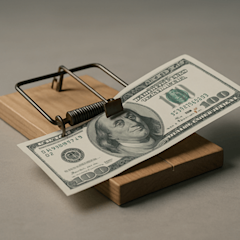The Dorm Room That Ate Wall Street
“Everything in the physical world is becoming intelligent.”
That’s what Michael Dell, founder of Dell, said in my latest podcast.
And that means…
– Microchips in everything
– Machines talking to machines
– Explosions of data
– AI doing the interpreting
He said the world we’re entering now makes the last few decades look like the pregame show. That includes genomics. Protein folding. Cancer treatment. Drug discovery.
It also includes enterprise-grade blockchain (yes, Dell is building it too), supply chain visibility, and cybersecurity — where the attack surface grows every day.
I asked if he ever considered putting Bitcoin on Dell’s balance sheet. He gave a measured answer: not yet.
But he’s personally invested, just to understand the space.
That’s how he operates.
If you don’t know anything about Michael Dell, here’s three things you should know:
One: He’s the rare founder who took his company public, then private, then public again — and came out ahead each time.
Two: He started that company in a dorm room — while most of us were playing video games and trying to survive sophomore year.
Three: He’s lived the full entrepreneur’s lifecycle: startup, scale-up, suit-up, fight-off-activists, and give-it-away.
The Dorm Room That Ate Wall Street
Michael made $80,000 a month while still in college by building and selling custom PCs—directly to small businesses like law firms, doctors’ offices, and even the State of Texas.
He realized that most personal computers were sold through retail stores with high markups and unnecessary features. He figured he could sell directly to customers, cut out the middlemen, and offer better prices and service.
He didn’t leave college in a blaze of rebellion. His parents actually staged an intervention to stop him from working on the business. So he shut it down for 10 days—cold turkey.
But he couldn’t stay away.
He told me: “It was what I was passionate about. It was pulling me in.” So he took a semester off. He planned to go back. He never did.
(He also admitted, by the way, that parents still send him angry letters saying he’s a bad example.)
We talked about the transition from dorm-room tinkerer to global CEO. We talked about how Dell was never really a consumer brand. 80% of revenue came from businesses, even in the earliest days.
But the part that really grabbed me — and might surprise you — was what happened years later. After the IPO. After the growth.
It was the fight.
When Sharks Smell Blood
Carl Icahn — activist investor, legendary poker-faced negotiator — came after Dell in 2013. Icahn didn’t own a single share when the go-private plan was announced. But he smelled blood.
“He didn’t know whether we made French fries or nuclear reactors,” Michael said. “Didn’t really care.”
Icahn saw a strange voting structure in the go-private proposal and figured he could force a higher payout. He used every trick: media pressure, public shaming, hardball tactics.
It got dark. Personal.
“It was just a big poker game to him,” Michael told me. “There were definitely some dark moments.”
But Dell played the long game. He got the votes. He took the company private.
He doubled down on enterprise, cloud, and infrastructure — and then brought Dell public again years later, stronger than before.
The Future is Upon Us
When I asked what makes a great CEO at that level, he didn’t talk about vision boards or charisma.
He said:
– Curiosity
– Being able to see around corners
– The ability to engage and inspire teams
He told me companies have to create space for employees who think like entrepreneurs. Most big companies squash those instincts. The best ones encourage them.
We talked about what’s next.
And this is where his demeanor changed. He lit up. Because Dell — the company — is playing a much bigger game now.
If you want to hear the full story — how he negotiated with Steve Jobs, kept his sanity, and why he believes the real future is just beginning — listen to our full conversation.
It’s one of my favorites of the year.










